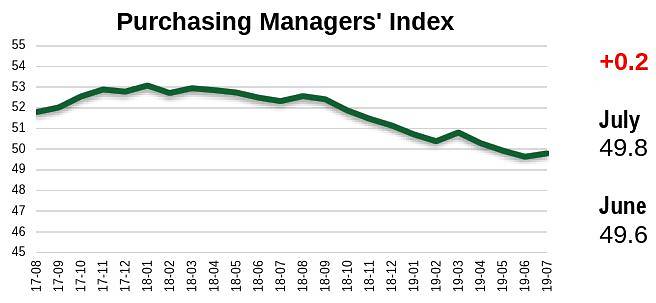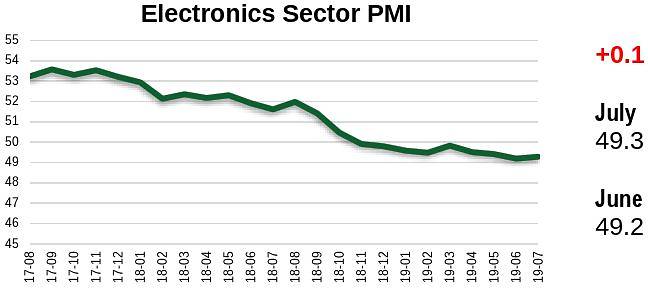SINGAPORE: Singapore’s factory activity contracted for a third consecutive month in July as global trade uncertainties caused costly disruptions to the current supply chains of local manufacturers, according to data released by Singapore Institute of Purchasing and Materials Management (SIPMM) on Friday (Aug 2).
But the pace of contraction slowed, with July’s Purchasing Managers’ Index (PMI) – which measures manufacturing activity and sentiment – at 49.8, edging up 0.2 points from June.
The PMI went below the 50.0 mark – separating expansion from contraction – in May, after 32 consecutive months of growth.

Singapore’s PMI index up to July 2019. (Graphic: SIPMM)
“The slight improvement of the PMI reading was attributed to the marginal expansion posted in new orders and factory output, as well as a continued expansion of new exports,” SIPMM said.
While the electronics sector contracted for the ninth straight month, the sector’s PMI improved slightly by 0.1 to 49.3. This was attributed to slower contraction of new orders, new exports, inventory and employment level, said SIPMM.

Singapore’s electronics PMI index up to July 2019. (Graphic: SIPMM)
GLOBAL RECESSION FEARED
Manufacturing also contracted across Asia and Europe last month, fuelling worries that a prolonged US-China trade war and an economic slowdown could tilt the world toward recession.
US President Donald Trump announced on Thursday he will hit China with punitive tariffs on another US$300 billion in goods, escalating the trade war.
That means the two largest economies in the world have now erected trade barriers covering virtually all of their US$660 billion in annual two-way merchandise trade.
China’s manufacturing activity contracted for a third month in a row, official data showed on Wednesday, with July’s PMI coming in at 49.7, slightly up from June’s figure of 49.4. Economists surveyed by Bloomberg had predicted a reading of 49.6.
Manufacturing activity in the euro zone fell at its steepest rate since late 2012 last month as demand sank, a survey compiled by IHS Markit showed on Thursday.
Forward-looking indicators in the survey suggested that manufacturing will not rebound anytime soon, and is likely to embolden policymakers at the European Central Bank, who last week all but promised to ease policy further as the bloc’s growth outlook deteriorates.




